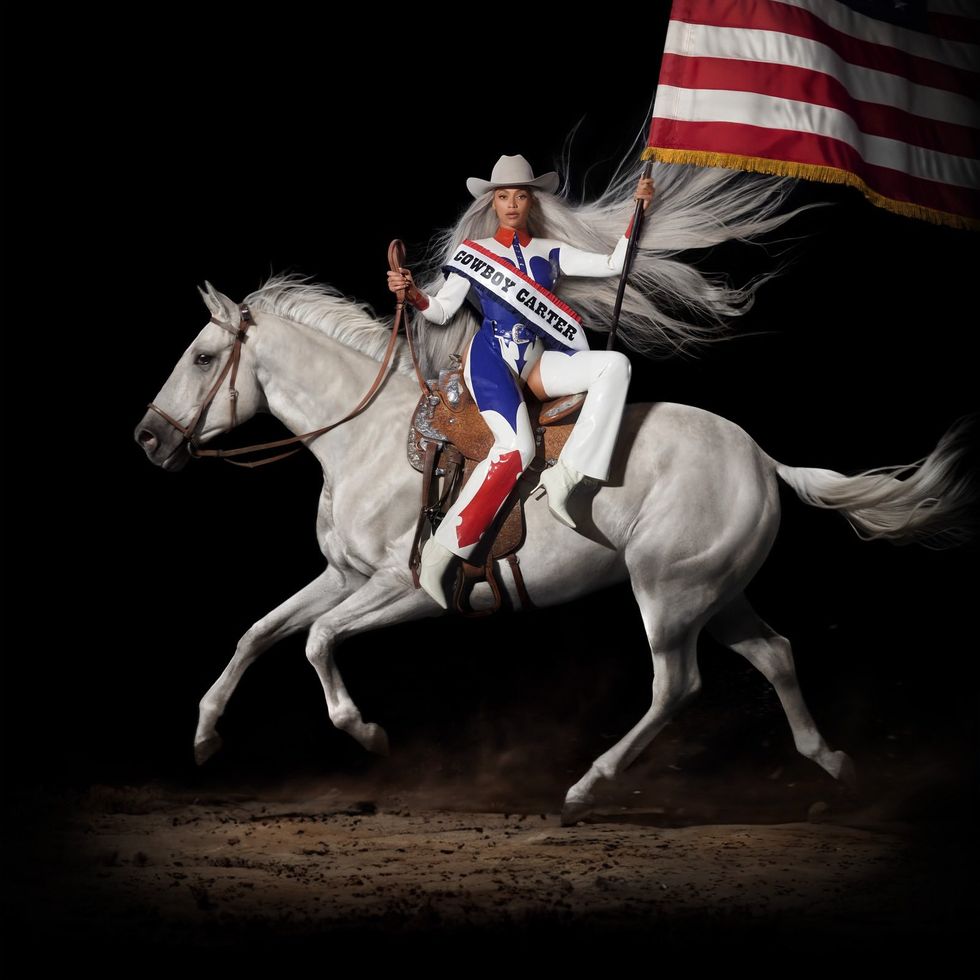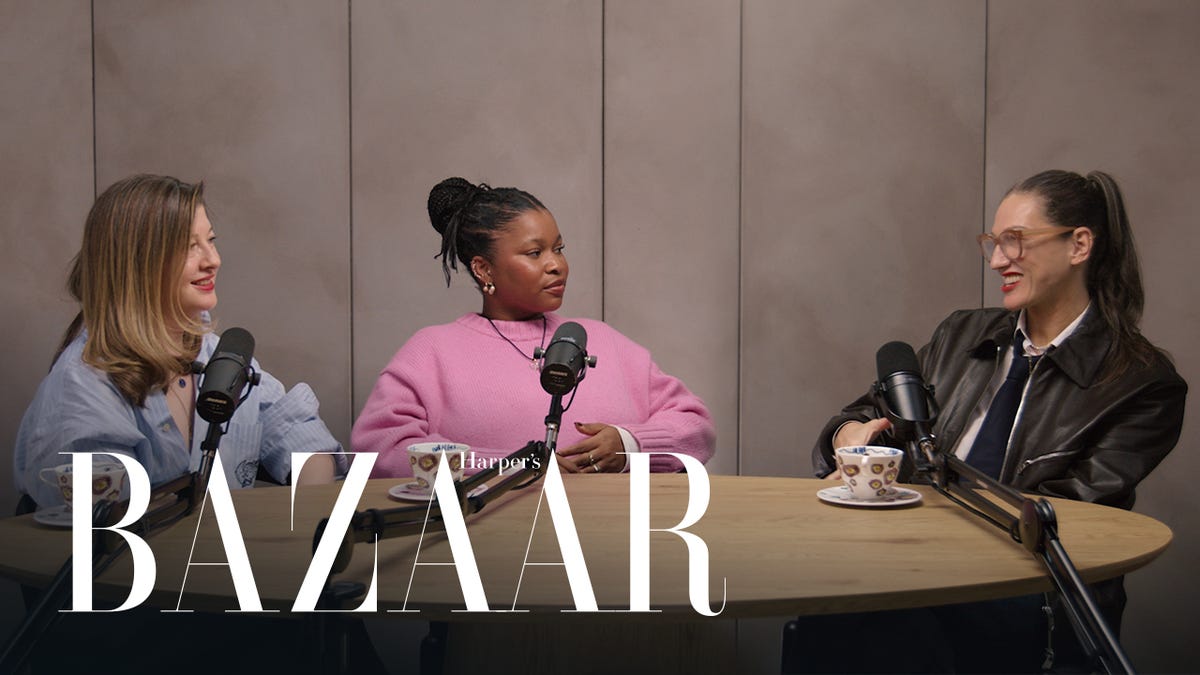For the last decade, Beyoncé has rejected the rigid and constricting pathways of pop stardom. While artists can get lost within the idea of themselves decades into their careers, Beyoncé has managed to maintain a sense of intrigue and a culture-shifting level of relevance. More importantly, she’s continued to keep her haters mad. It’s quite possibly her strongest superpower.
Cowboy Carter, the singer’s eighth studio album and “Act II” of a three-part project that began with 2022’s Renaissance, is her latest effort at maintaining her status as a musical enigma. Her most loyal fans have predicted she’d release a country album for quite some time, since she first experimented with the genre with “Daddy Lessons” on 2016’s Lemonade. She later performed the track alongside country’s own controversial queens, the Chicks, at the Country Music Association Awards that year—a moment that earned the awards show its highest-rated 15-minute broadcast ever, while simultaneously enraging what felt like all of Middle America (as well as Kenny Chesney, who looked particularly perturbed during the performance). Ten days before Cowboy Carter was released into the world, Beyoncé alluded to that moment—in which, despite being arguably the biggest star in the world, she felt unwelcome and unwanted—as the ultimate inspiration for pursuing a larger country project.
“This album has been over five years in the making. It was born out of an experience that I had years ago where I did not feel welcomed … and it was very clear that I wasn’t,” the singer shared on Instagram. “But, because of that experience, I did a deeper dive into the history of country music and studied our rich musical archive. It feels good to see how music can unite so many people around the world, while also amplifying the voices of some of the people who have dedicated so much of their lives educating on our musical history.”
She continued, “The criticisms I faced when I first entered this genre forced me to propel past the limitations that were put on me. Act II is a result of challenging myself, and taking my time to bend and blend genres together to create this body of work.”
It’s a moment that feels long overdue. There have been Black women in country music since long before Beyoncé, of course, and they shouldn’t be forgotten—performers like Linda Martell (who is featured on the album), and more modern acts like Mickey Guyton and Brittney Spencer (who appears on Cowboy Carter as well). It’s also worth noting that Beyoncé’s sister and fellow artist, Solange, experimented with western aesthetics for her fourth album, 2019’s When I Get Home, and paid homage to Texan rodeo culture, as well as the often erased history of Black cowboys.
As her career goes on, Beyoncé is creating a legacy as a performer unrestrained by any genre. She mentioned in her Renaissance concert film, released late last year, that as she has gotten older, she has realized her voice is her ultimate instrument—so why not stretch it to its limits and explore genres that were invented by and for Black people?
Cowboy Carter proves the infinite musical ability of Beyoncé, and more specifically, that if you have a voice worth listening to, fans will flock regardless of genre. The whopping 27-track album opens up with “Ameriican Requiem,” one of the most stunning showcases of the meticulous vocal stacking and harmonizing the singer has perfected over the years. As the album continues—with breezy Sheryl Crow–esque tracks like “Bodyguard” and “Alliigator Tears”—it’s clear that a 20-year-old Beyoncé, freshly into her solo career, could not have made this album. Cowboy Carter is the kind of feat that comes only with creative maturity and self-assurance in one’s artistry. While she utilizes core elements of country throughout the project—a twangy banjo, call-and-response, and sweeping storytelling—there are still pieces of the project that are inherently Beyoncé, such as trap beats, operatic vocals, and hilarious one-liners. “Cunty / Country,” she spits on “Spaghettii,” an early fan favorite.
The collaborations are also worthy of all the breathless fanfare they’ve received across social media. Dolly Parton recorded an introduction to Beyoncé’s long-rumored cover of “Jolene,” and Bey’s fellow Texan Willie Nelson makes appearances as well. Black country performers Spencer, Tanner Adell, Tiera Kennedy, and Reyna Roberts all appear on Beatles cover “Blackbiird,” while pop acts Miley Cyrus and Post Malone weave effortlessly into the project on “II Most Wanted” and “Levii’s Jeans.”
Ahead of the album’s release, Beyoncé described it as “Not a country album—[but] a Beyoncé album,” a simple statement that rings true once one sits with the record all the way through. Cowboy Carter is maybe the purest representation of the essence of Beyoncé, a woman who hails from Houston with maternal lineage from Louisiana—two states with deep, deep musical and Black history the world often wants us to forget. There are few artists of her caliber today who are creating work with such meticulous intention as to remind society of where so much of our favorite music comes from.
When listeners look back at Cowboy Carter in the decades to come, it will serve as the ultimate sonic biography of the musical shape-shifter that is Beyoncé. No other artist working today has the audacity to shake up a genre that for generations has shut out so many. It’s bigger than just the music. It’s about this moment in time and what changes from here on out.
Critics are often afraid to give Beyoncé too much credit—just take a look at the Recording Academy and its repeated snubs. But mere hours after its initial release, it’s clear that Cowboy Carter has already caused a shift. Country music for so long has represented a depiction of America in which Blackness was at the outskirts, not the center, and because of that, so many have shoved off the genre as something simply not for us. Beyoncé too, throughout her career, has been pigeonholed through pop parameters and racial limitations that have invited society to criticize the extent of her influence. (See again: the Recording Academy.)
“My hope is that years from now, the mention of an artist’s race, as it relates to releasing genres of music, will be irrelevant,” the singer wrote last week.
Longtime Beyoncé fans have known for quite some time that the star can do, well, anything. Cowboy Carter, masterful musical feat that it is, should convince everyone else.















